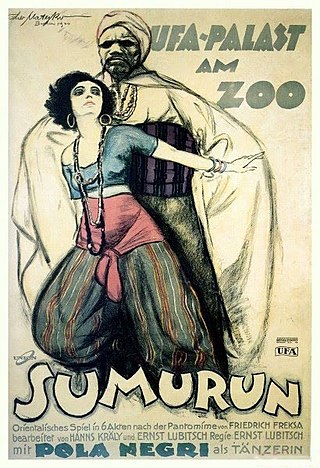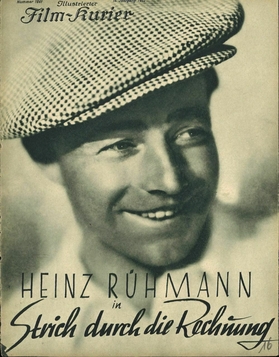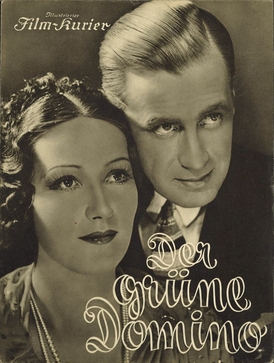Carl Wilhelm, was a prolific German film director, film producer and screenwriter of the silent film era, at the end of which his career apparently entirely faded away and he vanished into obscurity.
I Don't Want to Be a Man is a 1918 German film directed by Ernst Lubitsch.

Trude Hesterberg was a German film actress. She appeared in 89 films between 1917 and 1964.

Sumurun is a 1920 German silent film directed by Ernst Lubitsch based on a pantomime by Friedrich Freksa.
Sally, Sally Meyer or just Meyer was a silent movie slapstick character played by Ernst Lubitsch, before he moved to Hollywood. The character was an antisemitic satire of a Jewish businessman.

Margarete Kupfer was a German actress.

Carmen is a 1918 German silent drama film directed by Ernst Lubitsch and starring Pola Negri, Harry Liedtke, and Leopold von Ledebur. It was based on the novella Carmen by Prosper Mérimée. Like Bizet's opera Carmen, this film only adapts the third part of Mérimée's novella and transforms the character of Don José at the beginning of the story from bandit on the run to honest man in love with his childhood sweetheart. The film was released with English intertitles in the United States in 1921 under the alternative title Gypsy Blood.

When Four Do the Same is a 1917 German silent comedy drama film directed by Ernst Lubitsch and starring Ossi Oswalda, Emil Jannings and Margarete Kupfer. Lubitsch himself plays a book shop employee who falls in love with Jannings' daughter. The film was a key transitional work in Lubitsch's career, as he began to produce films with greater depth than his early light comedies.
The Humble Man and the Chanteuse is a 1925 German silent film directed by E. A. Dupont and starring Lil Dagover, Olga Limburg and Margarete Kupfer. It was based on a novel by Felix Hollaender.

Children of No Importance or The Illegitimate is a 1926 German silent drama film directed by Gerhard Lamprecht and starring Bernhard Goetzke, Margarete Kupfer and Elsa Wagner. It was part of the series of Enlightenment films produced in Weimar Germany, examining social issues such as illegitimate children.
The Woman with That Certain Something is a 1925 German silent comedy film directed by Erich Schönfelder and starring Rudolf Lettinger, Lee Parry and Bruno Kastner. It was shot at the Johannisthal Studios in Berlin. The film's sets were designed by the art director Kurt Richter.

Spoiling the Game is a 1932 German comedy film directed by Alfred Zeisler and starring Heinz Rühmann, Toni van Eyck, and Hermann Speelmans. Its hero is a young cyclist who enters a race.

And Who Is Kissing Me? is a 1933 German comedy film directed by E. W. Emo and starring Georg Alexander, Marion Taal, and Felix Bressart. It was shot at the Johannisthal Studios in Berlin. The film's sets were designed by the art director Max Heilbronner. A separate Italian-language version The Girl with the Bruise was also released the same year. It was loosely remade as a 1937 British film Paradise for Two, a 1940 Swedish film Kiss Her! and a 1951 British film Happy Go Lovely.

The Firm Gets Married is a 1931 German musical comedy film directed by Carl Wilhelm and starring Ralph Arthur Roberts, Charlotte Ander, and Oskar Karlweis. It is a remake of a 1914 silent comedy The Firm Gets Married starring Ernst Lubitsch.

Trouble in Paradise is a 1950 West German comedy film directed by Joe Stöckel and starring Olga Chekhova, Trude Hesterberg and Trude Haefelin. It was shot at the Bavaria Studios in Munich and on location in Mittenwald and Grainau. The film's sets were designed by the art directors Rudolf Pfenninger and Max Seefelder.

Two Under the Stars is a 1927 German silent film directed by Johannes Guter and Ernst Wolff and starring Margarete Schlegel, Ernst Deutsch and Jean Angelo.

The Irresistible Man is a 1937 German romantic comedy film directed by Géza von Bolváry and starring Anny Ondra, Hans Söhnker, and Trude Hesterberg.

The Ballet Girl is a 1918 German silent comedy film directed by Ernst Lubitsch and starring Ossi Oswalda, Harry Liedtke and Margarete Kupfer.

The Story of a Maid is a 1921 Austrian-German silent drama film directed by Reinhold Schünzel and starring Liane Haid, Otto Tressler and Erika Glässner. It premiered at the Marmorhaus in Berlin.

The Green Domino is a 1935 German mystery drama film directed by Herbert Selpin and starring Brigitte Horney, Karl Ludwig Diehl and Theodor Loos. It was shot at the Babelsberg Studios in Berlin and on location in Bavaria around Munich and the Tegernsee. The film's sets were designed by the art directors Otto Hunte and Willy Schiller. It is based on the novel Der Fall Claasen by Erich Ebermayer. A separate French-language version Le Domino vert was also produced, directed by Selpin and Henri Decoin but featuring a different cast.















